Dogs are curious creatures and often want to sample whatever their humans are eating. But when it comes to pickles, it's best to be cautious. Can dogs eat pickles? While pickles aren't necessarily toxic, they aren't the healthiest treat option for our canine companions.
Should Dogs Eat Pickles? Understanding the Risks
Pickles are cucumbers that have been preserved in a brine, typically made with salt, water, and vinegar. While cucumbers themselves are safe and healthy for dogs, the pickling process introduces ingredients that can be problematic.
Why Are Pickles Bad for Dogs?
High Sodium Content: Pickles are very high in sodium, which can be harmful to dogs, especially in large amounts. Excessive sodium intake can lead to dehydration, vomiting, diarrhea, and other health issues.
Harmful Ingredients: Many pickles contain additional ingredients like garlic, onions, and spices, which can be toxic to dogs. Garlic and onions can damage red blood cells and lead to anemia.
Spices and Seasonings: Some pickles are flavored with spices that can irritate a dog's digestive system.
Can Dogs Have a Little Bit of Pickle?
While a small bite of a plain pickle might not cause immediate harm, it's best to avoid giving pickles to dogs altogether. There are much healthier and safer treat options available.
What Happens If a Dog Eats a Pickle?
If your dog accidentally eats a pickle, monitor them for any signs of discomfort or illness. Symptoms to watch for include:
Vomiting
Diarrhea
Lethargy
Excessive thirst or urination
Tremors or seizures (in severe cases of sodium poisoning)
If you notice any of these symptoms, contact your veterinarian.
Cucumbers vs. Pickles for Dogs
Cucumbers are a healthy and refreshing treat for dogs. They are low in calories and a good source of vitamins and minerals. However, the pickling process adds salt and other potentially harmful ingredients, making pickles a less desirable option.
Expert Insights From Spot
As much as we love to share our favorite foods with our pets, it's important to remember that not all human foods are safe for dogs. Spot's internal data shows that pet insurance claims for dietary indiscretions in pets average $642*, underscoring the importance of caution and research before sharing snacks with our pets.
Conclusion
While pickles aren't necessarily toxic to dogs, they are not a recommended treat. Their high sodium content and potential for harmful ingredients make them a less-than-ideal choice for our canine companions. Choose safe and healthy alternatives to keep your dog happy and healthy.

With 10 years of experience as a pet parent, I aim to empower pet owners with insights into pet insurance and maintaining their pet's well-being. I aspire to be a trusted source, combining knowledge with a commitment to the welfare of our beloved pets.
*Jan 2019 to April 2024 administrator claims data
Anastasio, Alexandra. “Can Dogs Eat Pickles? Are Pickles Good for Dogs?: What To Know.” American Kennel Club, American Kennel Club, 26 Mar. 2024, www.akc.org/expert-advice/nutrition/can-dogs-eat-pickles/.
Arnold, Victoria. “Can Dogs Eat Pickles?” PetMD, 14 Dec. 2022, www.petmd.com/dog/nutrition/can-dogs-eat-pickles.
Roundy, Hannah. “Can Dogs Eat Pickles?” Sundays, n.d., sundaysfordogs.com/blog/can-dogs-eat-pickles.
The information presented in this article is for educational and informational purposes only and does not constitute or substitute for the advice of your veterinarian.












